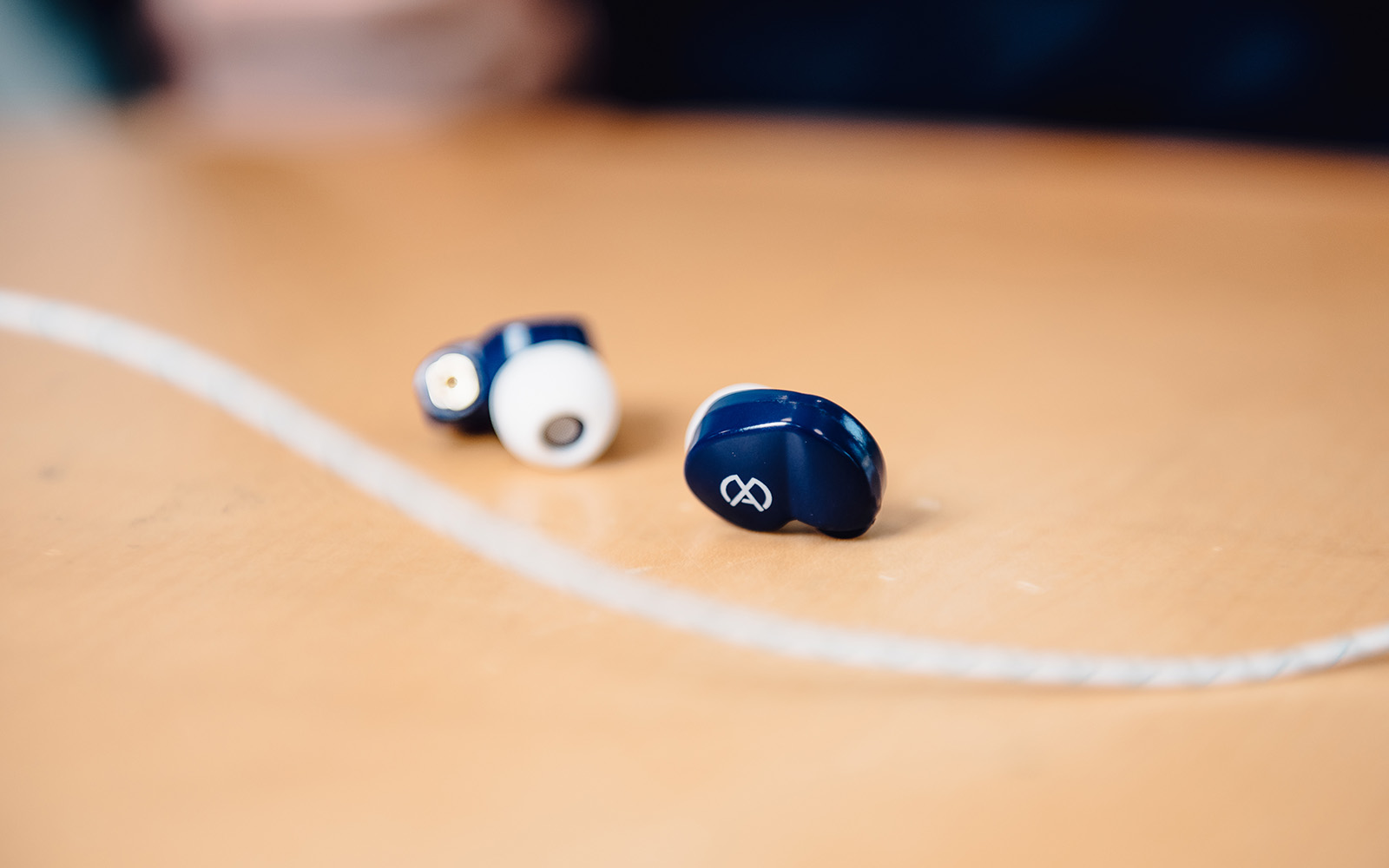
Ben Grosse, UConn Freshman and Business Owner, to Advise New Werth Institute
It isn’t easy running a $100,000-a-year, innovative, premium-performance earbud company while balancing the demands of academics and college activities, but freshman Ben Grosse doesn’t shy away from a challenge.
Grosse is co-owner and director of sales for mXers audio—a company that creates customizable earbuds that allow users to quickly alter the color, style, fit and sound of their audio devices.
This week, he is conducting a 3 a.m. conference call with the company’s supplier in China, planning the launch of a new “intense bass” product line, and making arrangements for pop-up and VIP Super Bowl demo parties.
“It’s definitely hard, but you learn to love it,” said Grosse, a business major. “You do it because you love your business and what you’re doing. That’s what drives you. You are building something for yourself.”
The 18-year-old has become a student adviser for UConn’s new Peter J. Werth Institute for Entrepreneurship and Innovation. Grosse hopes his story will inspire other entrepreneurial-minded students.
“I want other students to realize they can start a business in college,” he said. “If their first effort fails, they shouldn’t get discouraged. There are many problems out there waiting to be solved. The opportunities are really there for the taking.”
Disgusted Music Fans Seek a Better Solution to Broken Earbuds
By their sophomore year in high school, Grosse and his good friend Bharat Pulgam–now the company CEO–had racked up an impressive collection of broken earbuds. Their parents were less than thrilled at the bills for replacement sets, which ran $40 to $100. Often only one component of the earbud would break, but the only option was to replace the whole device, Grosse said.
“We didn’t like the tyranny,” Grosse joked. So armed with a high-school marketing class and a few videos on YouTube and Google, the two teens began their journey to create a better product in 2015.
Their first prototype (which was partly made of clay and a competitor’s device) was developed in early 2016, and the young men received a provisional patent. The first real earbud was created in July of 2016, with the project self-funded by the founders. By September, they were selling their earbuds online, at shows and at the University of Minnesota.
mXers Technologies LLC (mxersaudio.com) sells modular earbuds with five distinct and quickly interchangeable parts that can be customized to the type of music or sound to which the user is listening. There’s a device for rap and heavy metal, one for softer music, and a third for non-musical listening. The earbuds sell for $35.99 to $90.

Although Grosse won’t talk about sales numbers, due to a non-disclosure agreement, the earbuds are currently sold through Amazon, the company’s web site, and are under consideration by Target.
“What’s undervalued by prospective entrepreneurs is the ‘Why?’ factor. Why should you buy our earbuds—or any other product?” Grosse said. “We created a high-quality, innovative product that stands out in a highly saturated earbud market dominated by Beats, Bose, and Jaybird. We made a product that offers exceptional bass, upper echelon appeal and versatility for athletes–all in one product.”
The company’s advisers warned Grosse and his business partner that manufacturers abroad might be eager to spin-off their invention. But a sourcing agent helped them find a reputable factory in China willing to safeguard their trade secrets.
They also benefited from Fortune 500 company mentors, including senior vice presidents at Best Buy and Target, who gave them sound business advice. “We had great mentors and advisers for our business, but also for ourselves,” he said.
The pair, who grew up outside Minneapolis, Minn., also branched out and offered entrepreneurship events, including start-up weekends for other entrepreneurs. “We realized that this is much more than growing a business, you have to grow a start-up community,” Grosse said.
“It Just Clicked Right Away”
Grosse said he had long been a fan of UConn athletics and added the college to his tour of East Coast universities. “It just clicked right away,” he said of his interest in UConn.
A School of Business student, Grosse said he hasn’t yet declared a major. But he has sought advice from key business supporters on campus, including Business Professor David Noble, director of the Werth Institute, Kathy Rocha, managing director of entrepreneurship, and the Connecticut Small Business Development Centers.
Grosse is intrigued by the university’s new Werth Institute, which was created in December 2017 with a $22.5 million gift from pharmaceutical entrepreneur Peter. J. Werth. The center fosters entrepreneurship and innovation that has commercial application.
“I’m very excited to see what’s going on at UConn, especially with the Werth Institute,” Grosse said. “I feel like I’ve got four years to learn and dig deeper into business. I’m eager to grow!”
“We are excited to have Ben help shape our programs from the student perspective,” Noble said. “This is a place where students with big dreams will thrive. We hope to identify other students, across many schools and programs, who are equally excited about entrepreneurship.”
Entrepreneurship: Rewarding, Not Glamorous
Grosse said that owning a business is rewarding, but is not without its drawbacks.
“If you think you’re going to be a big-shot CEO, I will say that we worked for a long time in my friend’s basement in an 18- by 10- foot room. It was not at all glamorous,'” he said.
“One thing I’ve learned is patience!” Grosse said. “It took a year from prototype to getting a product in hand. That’s especially important when you don’t have a ton of capital. Also, we learned that something will always go wrong, but you have to bounce back and stay strong and keep driving.”
“I think other entrepreneurs should know you can do anything you set your mind do. Yes, you’re going to fail. Plenty of times I’ve given my pitch and people said, ‘That’s a terrible idea.’ People will be negative with you, but you have to take it in stride and benefit from constructive criticism. If you believe in what you’re working toward, you’ll combat that. It’s a mindset that you put in everything you do.”
Grosse is already exploring new entrepreneurial projects. A fan of surfing and rock climbing, he has a top-secret idea for an innovation for the action-sports industry.
“I remember the moment when we first held our new earbuds and thinking, ‘Wow! We can actually do this! We’re listening to music through earbuds that we made,'” he said. “Whenever I’m discouraged about something, I think back to those moments.”